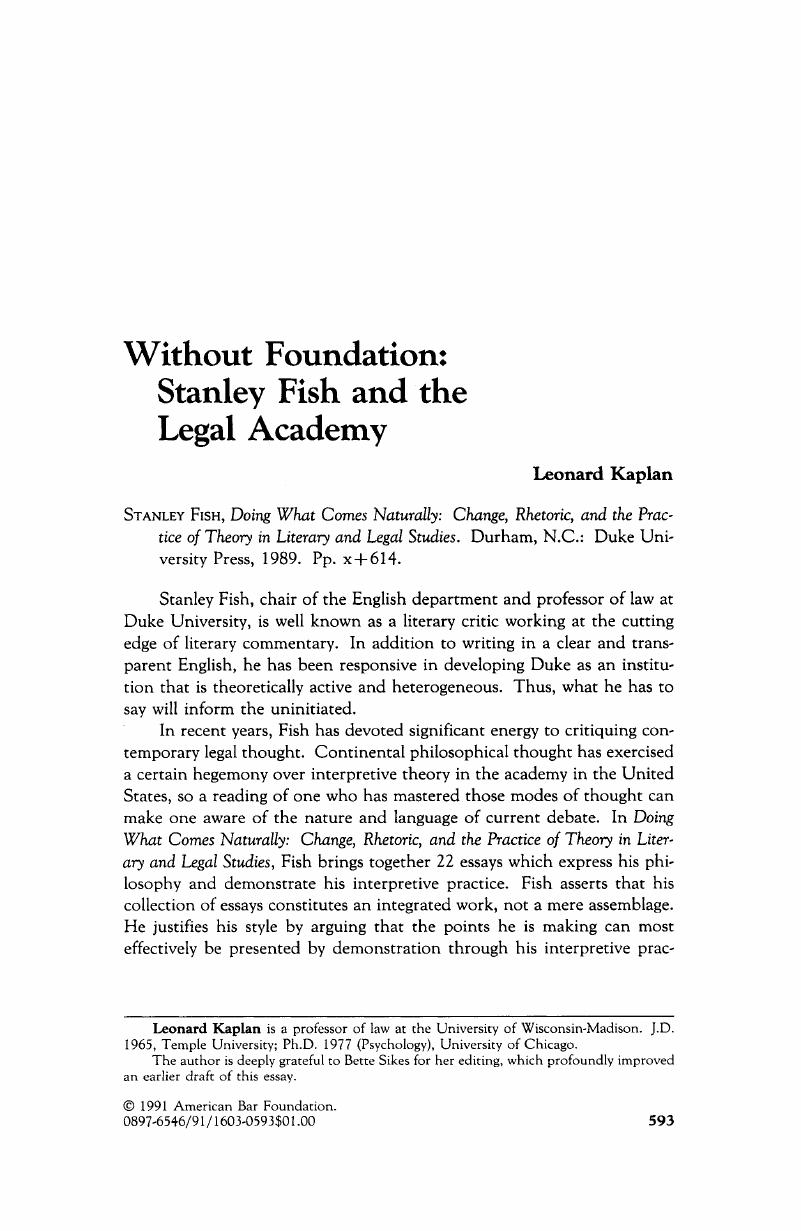Article contents
Without Foundation: Stanley Fish and the Legal Academy
Published online by Cambridge University Press: 27 December 2018
Abstract

- Type
- Review Essay
- Information
- Copyright
- Copyright © American Bar Foundation, 1991
References
1 Fish takes such a firm stand on each of his tenets that one wonders whether he would try to maintain that one could not predict that putting an arm in boiling water would very probably cause pain and tissue damage to most people most of the time. Is there not some intrinsic property of the human cell that makes it vulnerable to certain temperatures? Can we not rely sufficiently on theory of heat and cellular structure to act with as much assurance as any could desire to avoid a burning?.Google Scholar
2 The work of Toulmin that Fish discusses is Human Understanding (1972).Google Scholar
3 Dworkin, Ronald, Taking Rights Seriously (1977).Google Scholar
4 Ronald Dworkin, Law's Empire (1986).Google Scholar
5 Richard Posner, Law and Literature (1988); see also id., The Problems of Jurisprudence (1990).Google Scholar
6 Roberto Unger, Knowledge and Power (Boston, 1975).Google Scholar
7 I am preparing a separate essay which, centering on postmodernism and law will examine the relationship between Fish and Unger, so I will not treat the matter here. See L. Kaplan,” Anti-Metaphysics and the Quandary of Liberal Philosophy,”Philosophy and the Social Sciences, an International Journal (forthcoming).Google Scholar
8 60 Tex. L. Rev. 495 (1982); 9 Critical Inquiry 179 (1982).CrossRefGoogle Scholar
9 Dworkin, Ronald, “Law as Interpretation,” 60 Tex. Law Review 527 (1982).Google Scholar
10 Stanley Fish, Is There a Text in This Class? The Authority of Interpretive Communities (Cambridge, Mass.: Harvard University Press, 1980) (Fish, ”Text”).Google Scholar
11 Fish in one of his asides that rewards the reader sketches a reading of Agatha Christie's heroes and the nature of evil.Google Scholar
12 Ronald Dworkin,” My Reply to Stanley Fish (and Walter Benn Michaels): Please Don't Talk About Objectivity Anymore,”in W. Mitchell, ed., The Politics of Interpretation (1983).Google Scholar
13 Wolfgang Iser, The Act of Reading: A Theory of Aesthetic Response (Baltimore: Johns Hopkins University Press, 1978).Google Scholar
14 Published in 1963.Google Scholar
15 Fish, Text.Google Scholar
16 Fish's references are here and throughout the essay to Posner's “Law and Literature: A Relationship Reargued,” published in 1986 in the Virginia Law Review, which in part has been incorporated in Posner's book Law and Literature: A Misunderstood Relationship (Boston: Little, Brown & Co., 1988).Google Scholar
17 Alfred Schutz, Collected Papers, ed. Maurice Natason (The Hague: Martin Nijhoff, 1962); for a summary of Schutz's work see Richard J. Bernstein, The Restructuring of Social and Political (Philadelphia: University of Pennsylvania Press, 1978); Peter Berger & Thomas Luckmann, A Treatise in the Sociology of Knowledge (Garden City, N.Y.: Doubleday, 1967).Google Scholar
18 As it was indeed read, Fish points out, during the Middle Ages.Google Scholar
19 Posner at 223–43.Google Scholar
20 Published in 1989.Google Scholar
21 One issue on which Fish diverges from Carrington is on Carrington's characterization of the Critical Legal Studies movement as nihilistic. In his essay on “Fish v. Fiss,” (at 120–40), Fish argues that “nihilism is impossible” (at 139); interpretive community constrains against any possibility of unbridled interpretation even if one is a self-styled nihilist.Google Scholar
22 Fish has devoted a chapter in the book to Roberto Unger.Google Scholar
23 Kuhn related this experience in a university wide lecture he delivered at the University of Wisconsin in the late 1980s.Google Scholar
- 1
- Cited by




